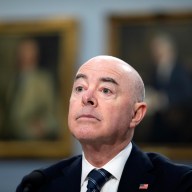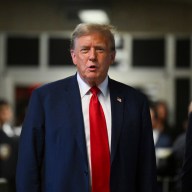 A monk talks on his mobile phone during a meeting of Buddhist monks at a monastery outside Yangon on June 27, 2013. Myanmar was due to reveal winners of two licences to provide mobile coverage in a country where less than 10 percent of the population has access to a telephone. Credit: Ye Aung Thu/AFP/Getty Images
A monk talks on his mobile phone during a meeting of Buddhist monks at a monastery outside Yangon on June 27, 2013. Myanmar was due to reveal winners of two licences to provide mobile coverage in a country where less than 10 percent of the population has access to a telephone. Credit: Ye Aung Thu/AFP/Getty Images
The process of awarding telecommunication licences in Myanmar has been closely watched as a test case for reform in Myanmar, reports Reuters from the capital, Yangon.
Myanmar, formerly known as Burma, is infamous for pervasive human rights violations committed by a military junta which has been ruling the country for decades. As late as November 7, 2013, Samantha Power, Barack Obama’s then Special Assistant on human rights wrote on the White House blog: “Serious human rights abuses against civilians in several regions continue, including against women and children”.
Perhaps it is therefore not surprising that Human Rights Watch has complained that a contemplated telecommunications law would also be violating the freedom of expression.
In large part to overcome these negative images of and to modernize the country he rules, President Thein Sein and his government has launched a series of political and economic reforms. Pride of place among those is a massive upgrade of the telecom sector. The measure is much needed. Mobile phone penetration in Myanmar is put as low as 4%, lower than that of North Korea.
Last summer two mobile licences were awarded to two foreign operators through a tender process managed by the influential Deputy Minister in the Ministry for Post and Telecommunications, U Thaung Tin. The Deputy Minister is controversial. During the tender process, a major firm in the telecom field founded by Thaung Tin and headed by his wife, Tin Tin Hye, conducted very significant business with various tender candidates. At the time, informed foreign observers such as Murae Ciantor, a Singapore based lawyer with the law firm Allens criticized the propriety of Thaung Tin’s apparent conflict: “For perceptions of impartiality, fairness and a level playing field, it is highly undesirable for government officials to have personal commercial interests in the sectors in which they regulate”.
Foreign telecom executives in Myanmar have long assumed Thaung Tin to have high level protection for his apparently brazen behaviour. Two weeks ago, evidence pointing to what kind of protection he may enjoy surfaced in Myanmar, a country noted for its corruption, 157 out of 177 on Transparency International’s index of corruptive practices.
The Myanmar Post and Telecommunications Ministry prepares to battle the new competition from the awardees of last summers’ tender, Telenor from Norway and Ooredoo of Qatar. To level the domestic playing field, the Ministry has, for months, conducted discussions and negotiations on a joint venture partnership with two Asian telecom firms, based on a decision by the Minister himself. Top level ministry personnel have conducted lengthy detailed sessions with these foreign firms.
Ignoring this process on December 5, U Thaung Tin, acting on his own, suddenly issued so called “requests for proposals” to three, different, foreign telecom firms. These included Japan’s KDDI, with which his and his wife’s firm conducts significant business. Neither the Minister himself nor the Managing Director or the General Manager of the Ministry were consulted or even forewarned in the matter. Outraged they leaked the story that when, after the fact, Thaung Tin was asked by ministry colleagues on whose authority he had acted, he supplied the name of U Soe Thein, minister in the presidential office. Speed in execution is apparently of the essence for U Soe Thein and his high-placed supporters. The winner, the partner for the MPT, in a very complex joint venture, is to be announced before Christmas.
Yangon’s community of foreign telecom experts and executives confidentially predict Myanmar’s further fall in Transparency International’s corruption index. The focus in this strange affair is now on the president’s own office.














